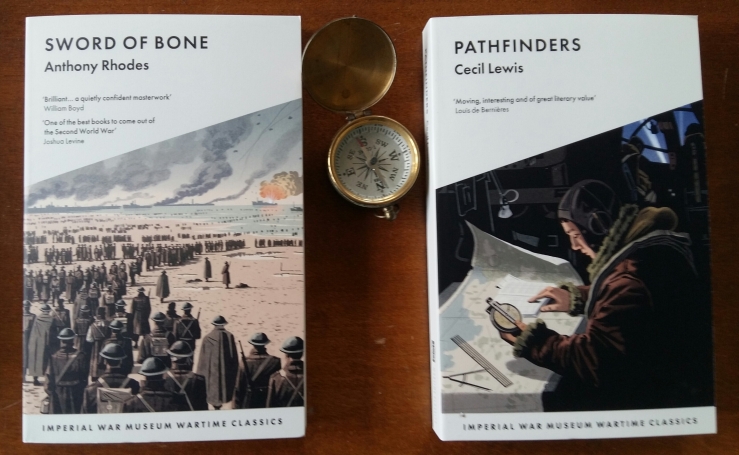
Welcome to today’s stop on the blog tour for Sword of Bone by Anthony Rhodes, one of the latest additions to the Imperial War Museum’s fabulous Wartime Classics series of rediscovered wartime classics. My thanks to Anne at Random Things Tours for finding me a place on the tour and to the Imperial War Museum for my advance review copy.
 About the Book
About the Book
It is September 1939. Shortly after war is declared, Anthony Rhodes is sent to France, serving with the British Army. His days are filled with the minutiae and mundanities of army life – friendships, billeting, administration – as the months of the “Phoney War” quickly pass and the conflict seems a distant prospect.
It is only in the spring of 1940 that the true situation becomes clear; the men are ordered to retreat to the coast and the beaches of Dunkirk, where they face a desperate and terrifying wait for evacuation.
Format: Paperback (236 pages) Publisher: Imperial War Museum
Publication date: 20th May 2021 [1942] Genre: Fiction, WW2
Find Sword of Bone on Goodreads
Purchase links
Bookshop.org
Disclosure: If you buy a book via the above link, I may earn a commission from Bookshop.org, whose fees support independent bookshops
Publisher | Hive | Amazon UK
Links provided for convenience only, not as part of an affiliate programme
My Review
First published in 1942, Sword of Bone is based on the author’s own wartime experiences including the evacuation of Dunkirk which took place between 27th May and 4th June 1940. The evacuation has come to be regarded as a seminal moment in the Second World War; indeed, it is often described as ‘the miracle of Dunkirk’, arguably something of a misnomer since, although hundreds of thousands of men were rescued, thousands more were left behind along with tons of equipment.
As usual, the introduction by Imperial War Museum historian, Alan Jeffreys, provides fascinating background information about the author, the book and its historical context. Describing Sword of Bone as a ‘lightly fictionalised memoir’, he argues the book is very much in the tradition of the war novels published in the 1920s dealing with the First World War, such as Siegfried Sassoon’s Memoirs of an Infrantry Officer.
The first part of the book covers Rhodes’s time in charge of an advance party sent to France with the task of finding quarters and sourcing equipment for the main division of the Royal Engineers which is to follow. Describing his role as ‘buyer, distributor, and journeyman’, he is fortunate to be assigned Georges de Treil as his French liaison officer. Amongst his many attributes is Georges’s seeming acquaintance with the maître d’hôtel of every restaurant in the area. As well as enticing Rhodes into some risky escapades, he introduces him to French customs such as the correct way to enjoy cheese and wine.
On 10th May 1940, the ‘Phoney War’ comes to an end as Rhodes learns of the invasion of Belgium and Holland, and the bombing of Arras. Reminding me a little of what has been revealed recently about the UK’s handling of the Coronavirus pandemic, Rhodes is amazed to discover that no plans exist for destroying the bridges across the strategically important River Dyle. Shortly afterwards he has his first experience of an early morning air raid which leaves him lying naked on the floor of his billet ‘covered in dust and shaving soap’. From that point on, the reality of war is vividly evoked, including the ‘double speak’ which sees the retreat of British forces described in news reports as ‘a strategic withdrawal according to plan’.
The book really comes alive in the final chapters which describe the chaos and confusion of the evacuation of the British Expeditionary Force from the beaches of Dunkirk, by which time ‘the Boche are everywhere’. To experience it in visual form, I recommend the film Dunkirk. The 1958 version would be my preference but then I’m a sucker for war films of the 1940s and 1950s. As it happens, given we’re close to the anniversary of the evacuation, the film was shown yesterday (30th May 2021) on BBC2 and is available via the BBC iPlayer for a limited time. There is also a touching moment in the 1942 film In Which We Serve starring Noel Coward (who also wrote the screenplay) when the crew of the fictional H.M.S. Torrin, having taken part in the evacuation, watch the soldiers they have rescued and returned safely to England leave the ship.
Having been picked up by a trawler, Rhodes arrives back in Dover; the line ‘In this way it ended’ from the final chapter perfectly summing up the reportage style of this fascinating book.
In three words: Authentic, detailed, fascinating
Try something similar: The Miracle of Dunkirk by Walter Lord
Follow this blog via Bloglovin
About the Author
Anthony Rhodes (1916–2004) served with the British Army in France during the so-called ‘Phoney War’ and was evacuated from Dunkirk in May 1940 – he based Sword of Bone on these experiences. After the conflict, Rhodes enjoyed a long academic and literary career and wrote on various subjects, including covering the 1956 Hungarian Revolution for the Daily Telegraph and producing well-regarded histories of the Vatican. He died in 2004.



Thanks for the blog tour support cathy x
LikeLike
Huh! From the title I thought this might be fantasy, but I’m glad I clicked. Sounds interesting, but… I’m kinda WWII-d out right now, so… maybe later.
LikeLike